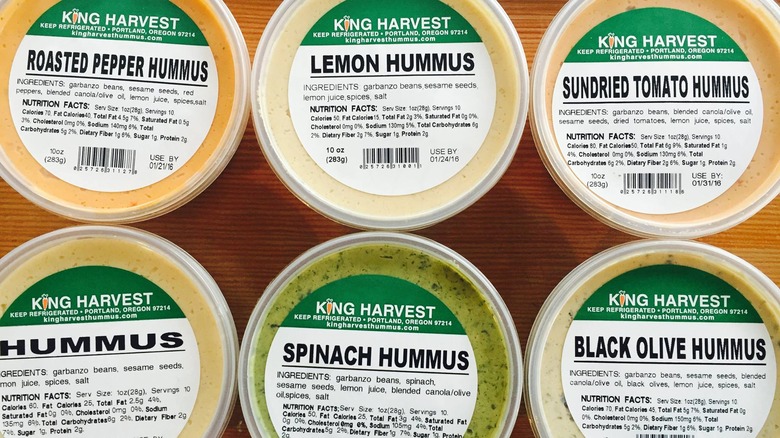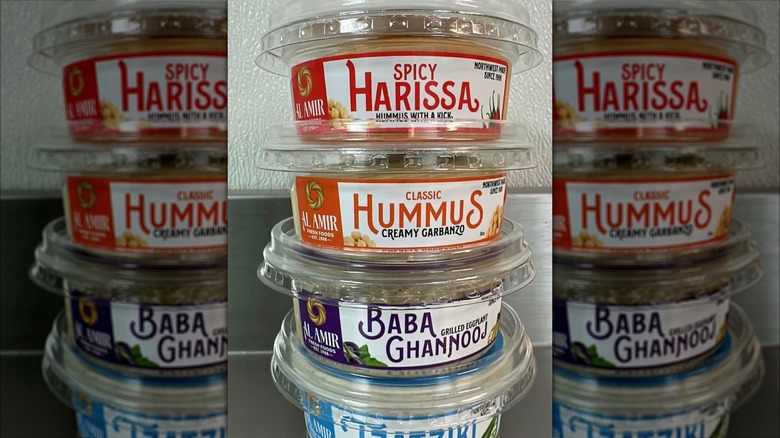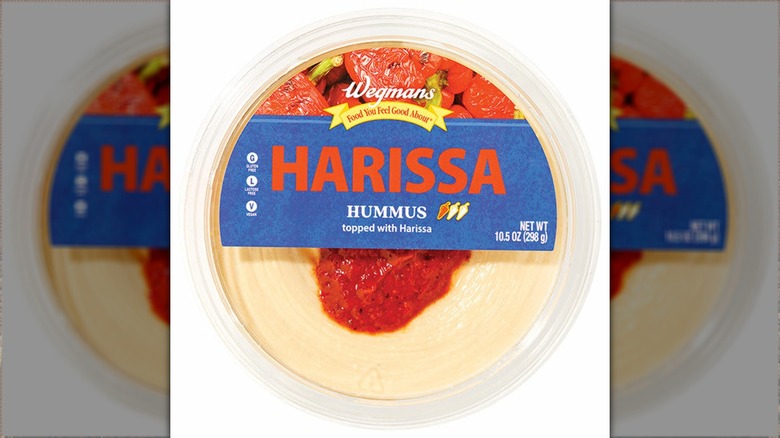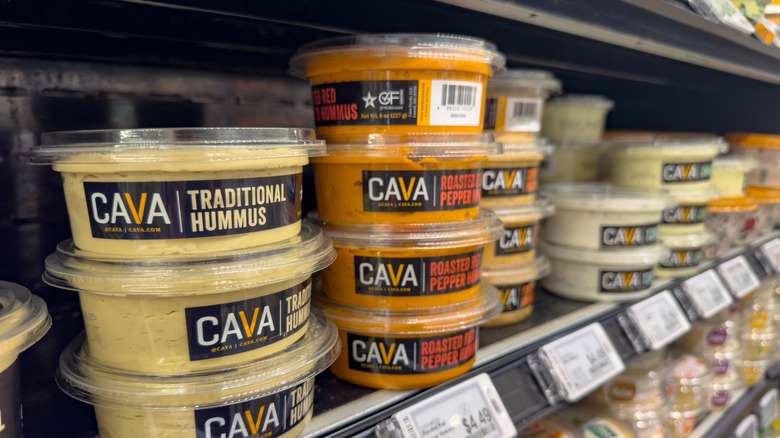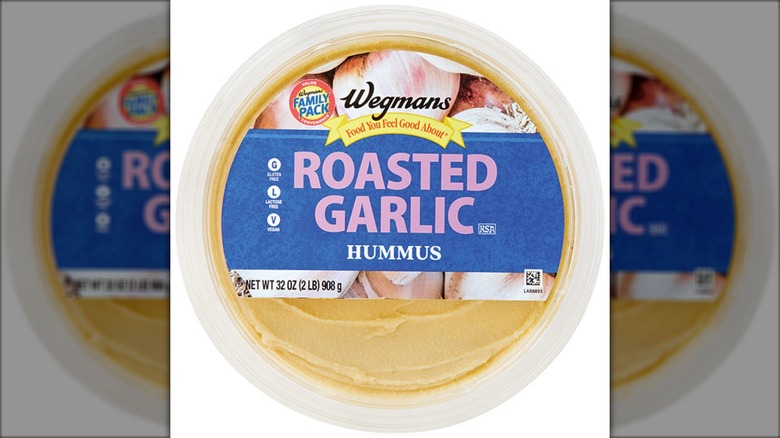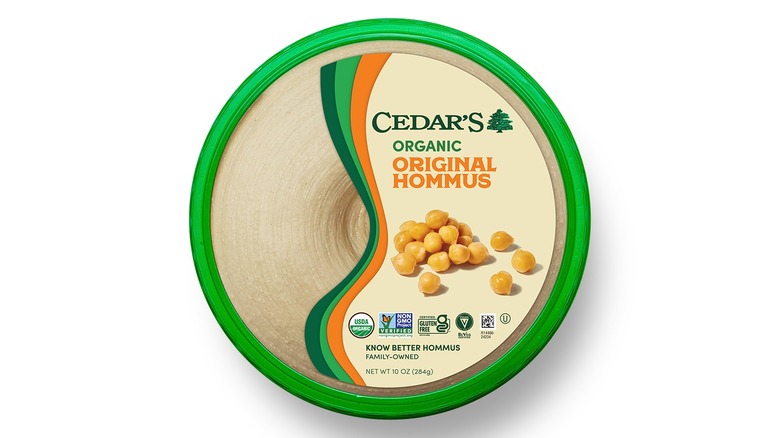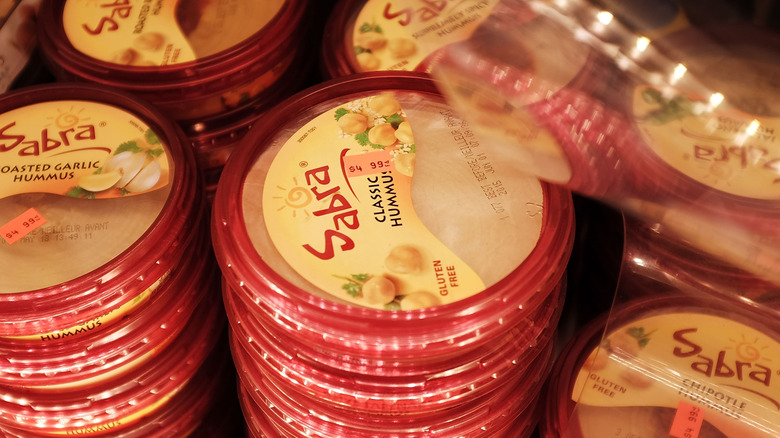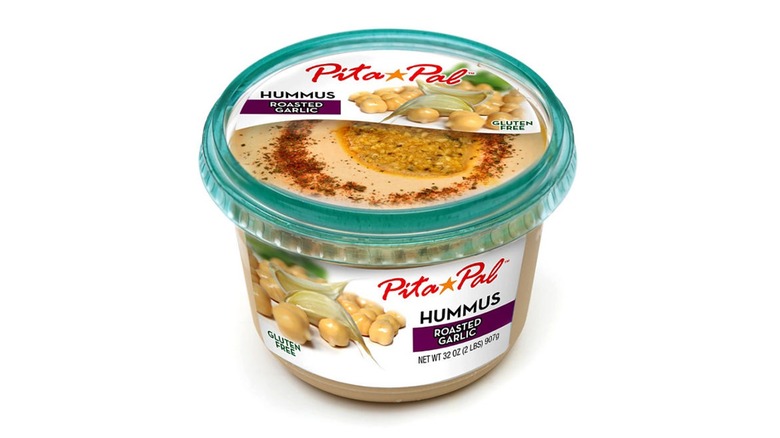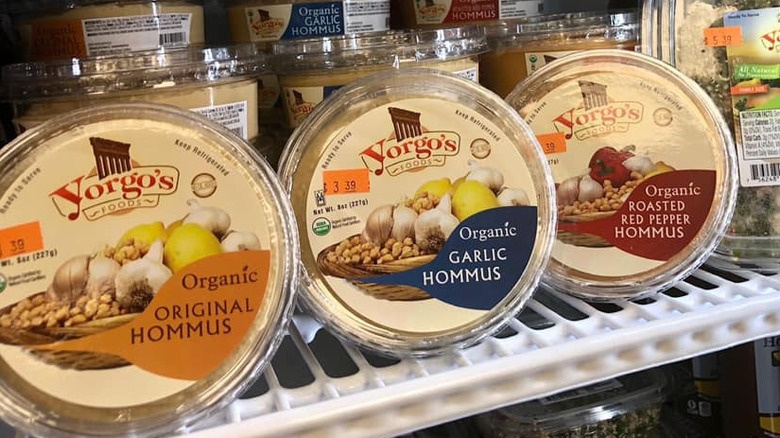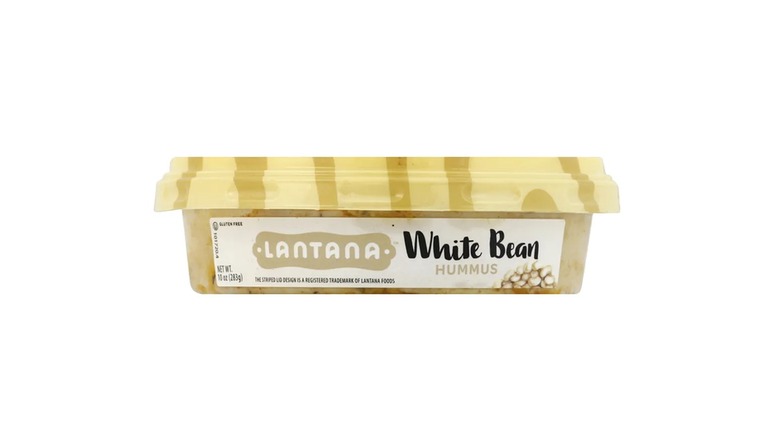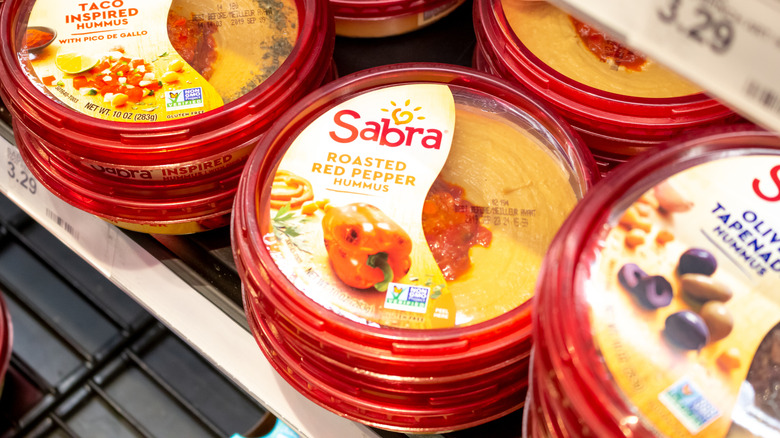11 Of The Biggest Hummus Recalls In US History
We may receive a commission on purchases made from links.
Nothing screams party quite like a table loaded with a selection of dips. Hummus takes home the title of one of the biggest crowd-pleasers for kids and adults alike, thanks to its nutty flavor that can be personalized to fit your preferred flavor profiles and paired with anything from raw vegetables to pita chips. Hummus traditionally blends chickpeas, tahini, olive oil, lemon juice, and garlic into a smooth texture. This protein-forward Middle Eastern dip can also be considered a healthy snack option that is especially popular with the vegetarian crowd (though there are some slightly less healthy versions out there, too).
Nowadays, you can find hummus offerings that reach far beyond savory and spicy flavor profiles, with the likes of chocolate and pumpkin spice hummus hitting store shelves. While hummus can be considered easy to whip up at home, there are plenty of options to choose from at your local grocery store. You may even have an allegiance to a particular hummus brand. But despite its popularity and nutritional value, even hummus isn't immune to the occasional recall. Various brands have had to recall hummus products due to issues with labeling, packaging, or contamination concerns over the years. Let's look back at some of the biggest hummus recalls in history.
King Harvest Hummus recalled over plastic fragments (2025)
One of the more recent hummus recalls hitting headlines is for King Harvest Hummus. Pacific Coast Fresh Co. out of Portland, Oregon, voluntarily recalled products due to possible plastic fragment contamination. The recall was categorized as Class II, which means that there was likely no risk of serious health consequences, but there could be temporary adverse effects.
The recall affected 71,987 cups of King Harvest Hummus products distributed by Pacific Fresh Co. to Kroger retailers such as Fred Meyer and QFC in Idaho, Oregon, and Washington. Products included 10-ounce varieties of balsamic, black olive, chipotle, classic hummus, lemon, spinach, roasted garlic, roasted pepper, toasted sesame, toasted onion, and sun-dried tomato flavors of hummus, with specific expiration dates in February and March 2025. While these dates had passed by the time of the recall, consumers were warned to check their freezers and throw out any offending products. There was still some element of risk because plastic fragments don't break down and can pose a choking hazard.
Al Amir Fresh Foods recalled hummus dip over undeclared sesame (2024)
Undeclared allergens are another frequent cause of food recalls is one due to undeclared allergens. The FDA often takes action if labels are found not to state allergen information for a food ingredient, as this can be a health hazard for those with food allergies or sensitivities. This was the case for Al Amir Fresh Foods in Milwaukie, Oregon, when it recalled its hummus dip in January 2024.
Although Al Amir Fresh Foods declared tahini on the labels of 8-ounce containers of its Classic Hummus Creamy Garbanzo and Harissa Spicy Hummus With a Kick, sesame wasn't specifically listed on the label. Tahini is a paste made from blended sesame seeds and oil. The affected products were last distributed in Oregon and Washington in January 2024.
No illnesses were reported, but those with sesame allergies were urged not to consume the affected hummus products. The brand's Baba Ghannooj Grilled Eggplant was also recalled for the same reason, while its Tzatziki Cucumber Yogurt was also included in the recall due to undeclared milk.
Summer Fresh Salads issued an allergy alert over undeclared sesame in Wegmans Harissa Hummus Topped with Harissa (2024)
The beloved East Coast grocery chain Wegmans is known for boasting a huge cheese and olive selection and a vast section dedicated to prepared foods, with both playing big roles in the store's famously loyal following. But even the most beloved stores aren't immune to recalls. Summer Fresh Salads from Woodbridge in Ontario, Canada, issued an allergy alert recall for the Wegmans Harissa Hummus Topped with Harissa due to undeclared sesame in January 2024.
As one of the nine major allergens that must be cited on food labels, sesame can induce serious and life-threatening allergic reactions. According to the FDA, the recall affected 10.5-ounce Wegmans-branded hummus products that were sold in specific Wegmans stores in Delaware, Maryland, Massachusetts, New Jersey, New York, North Carolina, Pennsylvania, Virginia, and Washington, D.C. between January 29 and February 2, 2024. An investigation ultimately found that the lack of sesame labeling on the packaging was a labeling error. No illnesses were reported at the time of the recall.
CAVA recalled hummus due to an undeclared sesame allergen (2023)
You may have visited Cava Group's fast-growing Mediterranean restaurant chain, Cava, but if you aren't lucky enough to have nearby location, you can try out Cava's Mediterranean dips and spreads, including various flavors of hummus. In 2023, Cava issued a voluntary recall of some of its packaged 8-ounce Cava Spicy Hummus due to undeclared sesame. The hummus was sold nationwide at retailers such as Whole Foods Market, Giant Foods, Mom's Organic Market, and other regional independent stores.
An FDA investigation was sparked after a retailer notified Cava that the wrong lid — one for Cava Spicy Labneh — was applied to the packaging of affected containers of Cava Spicy Hummus. Since Cava Spicy Labneh didn't contain sesame, the labels on the lids did not list it as an ingredient. It was found that a third-party supplier applied a limited number of incorrect lids on packages of Cava Spicy Hummus. No customer complaints of illness were filed, and the recall was ultimately terminated.
Wegmans recalled flavored hummus potentially containing plastic pieces (2022)
Wegmans was hit by another recall of its generic brand hummus in 2022. This time, the store recalled its 2-pound tubs of Wegmans Roasted Garlic Hummus over concerns that the product may have contained pieces of blue plastic. The affected hummus was sold in Maryland, Massachusetts, New Jersey, New York, North Carolina, Pennsylvania, and Virginia before being recalled. It is unclear what led to the plastic pieces contaminating the Wegmans hummus, with officials defining this recall as a Class II.
Whether the concern was choking on the plastic pieces in the hummus or a contamination issue, it's safe to say that plastic is not for consumption. We already unintentionally consume microplastics through food or water, and consuming actual pieces of plastic certainly doesn't help matters. Either way, keeping plastic out of our hummus certainly makes it more appetizing.
Cedar's Organic Hommus recalled due to undeclared allergen (2021)
Allergy-related recalls are not uncommon, but this one reached more states than other cases on the list. Cedar's Mediterranean Foods issued a recall of its Cedar's Organic Mediterranean Hommus for this reason in 2021. The recall was sparked by a mislabeled container that did not scan at a retailer. Through that, it was discovered that an incorrect label resulted in one allergen, pine nuts, not being listed on the hummus.
The product was distributed in over 20 states, ranging from California and Nevada all the way to New York and Maine. No illnesses were reported, and no other Cedar Mediterranean Foods products were affected in the recall. However, knowing that products contain pine nuts is especially important to those who have an allergy or sensitivity to tree nuts, as some allergic reactions can have serious consequences.
Sabra recalls Classic Hummus over potential salmonella contamination (2021)
Sabra Dipping Company is one of the biggest hummus brands on the market. The company has been around since the 1980s. You will likely find several Sabra hummus flavor options in your local grocery store. With the massive amounts of product, quality control is key. Sabra voluntarily recalled approximately 2,100 cases of its 10-ounce containers of Sabra Classic Hummus in 2021. The recall was sparked after a routine FDA screening of a single tub of hummus found potential salmonella contamination.
Officials got the product recall specific enough that it was accurate to the time of day it was initially produced. The recalled hummus was distributed to 16 states: Alabama, Arizona, Arkansas, California, Florida, Indiana, Mississippi, Maine, Missouri, Nebraska, North Carolina, New Jersey, Utah, Virginia, Washington, and Wisconsin.
No illnesses were reported in connection with the recall. Eating a product contaminated with salmonella can cause salmonellosis in as little as 12 hours, but it may take up to three days. Symptoms include abdominal cramps, diarrhea, and fever. Salmonellosis can worsen into more severe illness for older victims, infants, and those with weakened immune systems.
Pita Pal recalled hummus products over listeria concerns (2019)
Another larger recall occurred in 2019 that affected hummus products sold under popular brand names such as Fresh Thyme, Harris Teeter, Roundy's, and Schnucks. Pita Pal Foods, LP of Houston, Texas, issued a voluntary recall of nearly 90 hummus products produced between May and June of that same year. Affected hummus products were distributed nationwide and to the United Arab Emirates.
The recall was prompted after an FDA inspection found that Listeria monocytogenes was identified at the manufacturing facility, but not in the hummus products themselves. The bacteria can cause short-term symptoms like fever, headaches, stiffness, nausea, abdominal pain, and diarrhea in healthy people, as well as more severe infections in young children and in the elderly. Luckily, no illnesses were reported.
Recalled products ranged from the pre-made snack and dip combinations like the Fresh Thyme Original Hummus with Pretzels and Hummus Hummus Original Hummus to more specialty flavors, such as Harris Teeter Fresh Foods Market Roasted Red Pepper Hummus and Lantana White Bean Hummus.
Yorgo's Foods recalled flavored hummus due to the risk of listeria contamination (2017)
Yorgo's Foods of Manchester, New Hampshire, appears to have gone out of business since this November 2017 recall, although it is unclear if the two are related. The recall began as a smaller one over potential contamination, sparked by the discovery of Listeria monocytogenes in the processing environment during FDA sampling. Certain lots of 8-ounce and 16-ounce tubs of hummus products — such as its garlic, green olive, spinach and artichoke, roasted red pepper, or lemon varieties — were initially recalled. The products in this recall were believed to have been distributed at stores in New York and New Jersey.
However, the recall expanded days later to include all Greek-style foods manufactured by Yorgo's Foods and distributed to stores nationwide. This recall incorporated 12-ounce and 32-ounce tubs, as well as 2-pound and 5-pound bags. It was also revealed that bacteria were found in a sample of Yorgo's Original Tahini Sauce, in addition to the processing environment. Yorgo's Foods suspended manufacturing while under FDA investigation, but it is unclear if it ever resumed after the recall. No illnesses were reported.
House of Thaller recalled select packages over listeria concerns (2017)
Listeria contamination concerns were also the culprit of this 2017 recall of House of Thaller hummus. The Knoxville, Tennessee, company voluntarily recalled select 10-ounce packages of its Hummus with Pine Nut Topping after its pine nut supplier, Hudson Valley Farms, recalled the roasted nuts used in the topping. That pine nut recall occurred after a different item from the same supplier tested positive for Listeria monocytogenes. This prompted Hudson Valley Farms to recall all products made in the production facility during the potential contamination timeframe.
Affected tubs of Hummus with Pine Nut Topping were sold at grocery stores nationwide from April 2017 to June 2017, and in Canada in April 2017. Products were sold under Walmart's Marketside brand as Marketside Classic Hummus with Pine Nuts. The Lantana White Bean Hummus with Pine Nut & Herb Topping and a variety of Fresh Foods Market Artisan Hummus containing pine nuts were also affected in the recall. The recalled hummus was also sold at Target, HEB, and Giant Eagle stores. No illnesses were reported, but Hudson Valley Farms paused operations.
Sabra recalled hummus over possible listeria contamination (2015 to 2016)
You may remember this hummus recall from 2015 to 2016 over potential listeria contamination. What started as more than 30,000 cases of hummus being recalled voluntarily in April 2015 was expanded by Taylor Farms due to the use of Sabra Dipping Company hummus products in prepared snack boxes.
The White Plains, New York, company initially recalled the hummus after a routine inspection at a Kroger outlet in Port Huron, Michigan, detected Listeria monocytogenes in a random sample of Sabra hummus. The recalled flavors included the Sabra Classic Hummus in 10-ounce and 30-ounce sizes, as well as certain multipacks of Sabra Classic Hummus and the Hummus Dual Pack.
When the recall expanded in 2016, it included Taylor Farms Veggie and Hummus Bistro Boxes and Schnucks Vegetable and Hummus Snack Trays with specific expiry dates, as they included 2-ounce containers of Sabra Classic Hummus. These were sold throughout 23 states and Washington, D.C. Though no illnesses were reported, Sabra made headlines for all the wrong reasons during this recall and its expansion.

